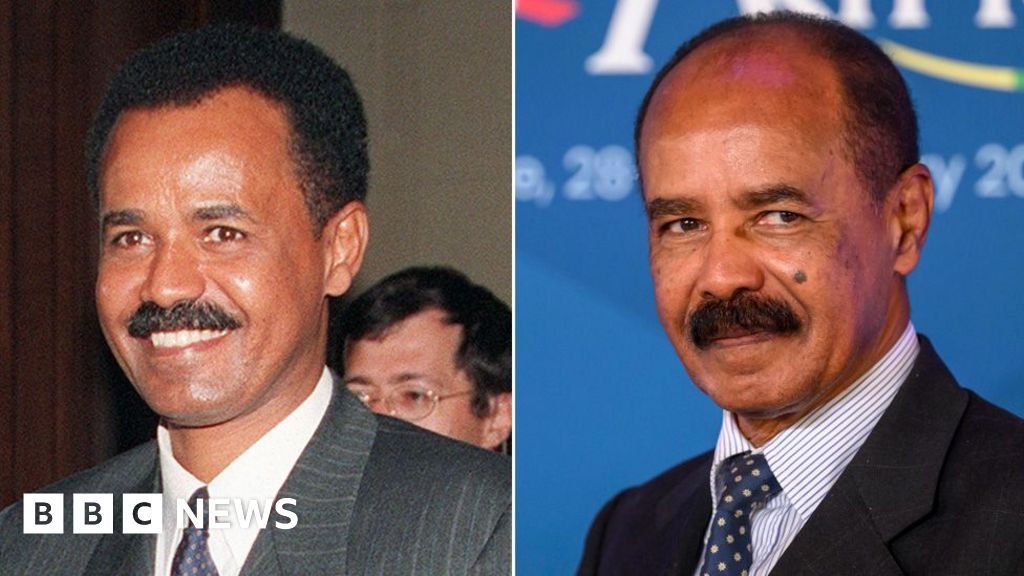Contents
Eritrea’s Isaias Afwerki: 32 Years in Power and Still Going Strong, But at What Cost?
Isaias Afwerki, Eritrea’s president, has marked 32 years in power, defying expectations and sparking controversy over his authoritarian rule. Despite initial hopes for democratic reforms, his regime has been criticized for human rights abuses, suppression of dissent, and a struggling economy. As he nears 80, many wonder what the future holds for Eritrea and its people.
The story of Isaias Afwerki, Eritrea’s president, is one of contrasts. Who would have thought that a man hailed as a hero of independence and a potential leader of a new generation of African reformers would become one of the continent’s most authoritarian leaders? What happened to the charismatic leader who, in the 1990s, inspired hope both at home and abroad? Where did it all go wrong for a country that seemed to be on the path to democracy and prosperity? When did Isaias’s rule become synonymous with repression and human rights abuses? Why did he abandon his initial promises of democratic reforms, and how did he manage to maintain his grip on power for so long?
Early Years and Promises of Democracy
In the early 1990s, Isaias Afwerki was seen as a breath of fresh air in African politics. He had led the Eritrean People’s Liberation Front (EPLF) to victory against Ethiopia in 1991, and his country gained formal independence in 1993. He was tall, charismatic, and seemed to embody the hopes and aspirations of his people. In 1993, he attended a continental leaders’ summit in Cairo, where he criticized older African leaders for clinging to power and promised a democratic order that would underpin the social and economic development of his people.
International Recognition and Initial Reforms
Isaias’s stance won him international recognition, and he was invited to the Oval Office by US President Bill Clinton in 1995. Eritrea had just begun drafting a new constitution, which was expected to establish the rule of law and a democratic system. Isaias was supposed to be a “transitional president” until a constitutional government was elected. The new constitution was ratified in 1997, and many believed that Eritrea was on the path to democracy.
However, things took a turn for the worse when war broke out between Eritrea and Ethiopia over a disputed border in 1998. Isaias was accused of using the war as a justification to postpone national elections indefinitely. He had promised a multiparty democratic system, but his resolve was tested after a peace agreement was reached in 2000. Several of his cabinet ministers, including former close friends and comrades-in-arms, began to call for reform.
Suppression of Dissent and Human Rights Abuses
The situation took a darker turn in September 2001, when the authorities shut down all independent newspapers, effectively silencing critical voices. Many editors and journalists were detained and never seen again. Simultaneously, the government arrested 11 senior government officials, including three former foreign ministers, a chief of staff of the armed forces, and several members of the national assembly. They have not been seen or heard from since.
Isaias’s regime has been criticized for human rights abuses, including arbitrary arrest, detention, and torture. The country has been isolated internationally, and many Eritreans have fled in search of freedom. Despite criticism at home, President Isaias retains support among parts of the population, particularly within the military, ruling party networks, and those who view him as a symbol of national independence and resistance against foreign interference.
Economic Struggles and Lack of Progress
The country’s economy has struggled, with the World Bank assessing that economic activity is constrained by underdeveloped infrastructure, limited competition due to state dominance, and strict import controls. Isaias himself acknowledged problems in an interview with state TV in December last year, saying that a subsistence economy would lead nowhere. However, he refuses humanitarian aid, citing fears of dependency that would undermine his principle of “self-reliance.”
Key highlights of Isaias’s rule include:
* 32 years in power with no election
* Suppression of dissent and human rights abuses
* Struggling economy with limited infrastructure and competition
* Refusal of humanitarian aid
* Isolation from the international community
Some notable quotes from Isaias and others include:
* “I had never had any intention of participating in political parties.” – Isaias Afwerki
* “He systematically weakened and removed leaders with public legitimacy and struggle credentials who could challenge his authority.” – Abdella Adem, former regional governor and senior ambassador
* “The president’s office is what’s holding the country from collapse.” – Zeraslasie Shiker, former diplomat and PhD candidate
As Isaias nears 80, many wonder what the future holds for Eritrea and its people. There is no obvious succession plan or credible opposition in the country who could replace the current regime. The president’s office is seen as the only thing holding the country together, and many fear what could happen next.
Conclusion:
Eritrea’s story under Isaias Afwerki is a complex and troubling one. Despite initial hopes for democracy and prosperity, the country has become synonymous with repression and human rights abuses. As the president nears 80, many wonder what the future holds for Eritrea and its people. Will there be a transition to democracy, or will the country continue down the path of authoritarianism? Only time will tell.
Keywords:
Eritrea, Isaias Afwerki, authoritarianism, human rights abuses, democracy, economy, self-reliance, international isolation, succession plan, opposition, future
Hashtags:
#Eritrea #IsaiasAfwerki #Authoritarianism #HumanRights #Democracy #Economy #SelfReliance #InternationalIsolation #SuccessionPlan #Opposition #Future
Source link




